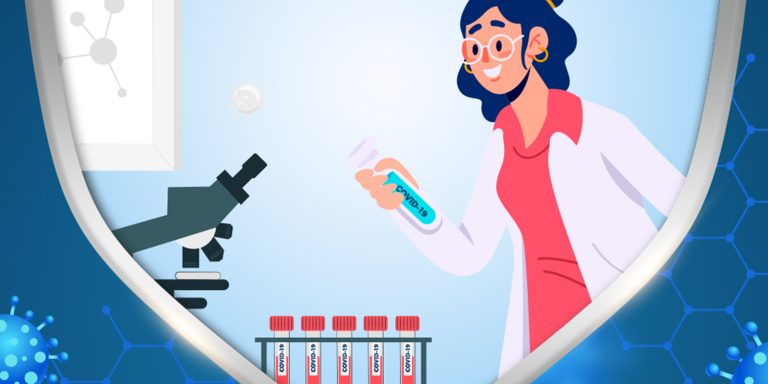
What’s believed to be emerged in the Hubei province of China in November 2019 and transmuted into pandemic a month later; has shaken the World over the period of five months. Yes, we are talking about SARS-CoV-2 (COVID-19) disease which has taken the lives of more than 5,40,000 people. Scientists are moving at the speed of light to create the vaccines for this lethal virus. As this Novel virus explodes in the countries across the Globe, hospitals and public health agencies are battening down for mass testing.
Keith Chappell, one of the renowned molecular virologists says the aspirational goal is to have a candidate vaccine ready for the human test at the earliest to bring down the transmission rate. Till then, Antibody tests are important, for establishing who has had the virus as many people infected seem to show mild or no symptoms at all. We have a very complex body structure composed of a wide variety of specialized cells. When we are infected by bacteria, viruses, or other foreign bodies (known as Antigen) that harm us; our natural defence (immune system) produces antibodies to terminate them. The antibodies are distinctive organic compounds that are unique to the virus or bacteria that they destroy. This is the automatic support mechanism of the body to fight the disease. When the invading virus is new-fangled, our immune system requires time to produce the antibodies. In short, our body’s immune system has to have the antibodies which make us immune to the viral disease.
The Indian Council of Medical Research has recommended ELISA (short for ‘enzyme-linked immunosorbent assay’) and CLIA for labs to test for COVID-19 IgG antibodies throughout the country.
Mainly, there are two types of antibody tests which are IgM and IgG which usually provide quick results based on a few drops of blood. The antibody test is cost-effective but it is not for the early analysis as it appears after the 7 days of infection. Nonetheless, the importance of the antibody test is that it can help officials to decide what is the regional variation of the virus. Based on that, the current coding of the containment zones across our country is being implemented so that the government and medical authorities can plan further response to flatten the curve.
After a person gets infected with the virus, the body first shows the rise in immunoglobulin M which is called IgM. After 7 to 14 days, the body mounts immunoglobulin G which is IgG. When that person is healthy (not having any other disease) IgM levels rise before the IgG levels. So, the tests first focus on IgM to know if someone is infected with the virus or not. When IgM starts coming down, the IgG in the body starts spiking. IgG is what we look at to examine whether that person has a long-lasting immunity. Even if the person was asymptomatic and had COVID-19 before, the high IgG levels exhibit that the body was infected and yet it had sufficient immunity to recover from it.
If both the IgM and IgG antibody test results are ‘negative’, then the patient is said to be either in the ‘incubation period’ or is ‘uninfected’. The incubation or window period is the time between exposure to the virus and onset of symptoms which usually takes on an average of 5 to 6 days.
On the other hand, antibody tests may not be able to show whether the virus is currently infecting the body. When someone has any ongoing symptoms of COVID-19, RT-PCR is the most accurate test to diagnose the presence of a virus in the body. RT-PCR stands for a reverse-transcription polymerase chain reaction – which takes genetic materials from the existing virus.
RT-PCR is extracting RNA from the nasal or mouth swab. Due to the Genome sequencing technology, we have the sequence of SARS-COV-2, and RNA of the swab is checked whether virus and RNA share the same sequence. These tests are considered more reliable and precise worldwide. Even the Indian Council of Medical Research Department has proclaimed RT-PCR as the gold standard test for identifying the COVID-19 cases.
When the RT-PCR is positive and IgG is negative, the person is infected with the virus. The negative RT-PCR and IgG indicate the person is under risk of the virus. If the situation is where RT-PCR is negative but the IgG levels are positive, the person is probably immunized to the virus.
In these crucial times, one has to comprehend that each test has its own advantages and shortcomings. A single test cannot exhibit an accurate result.
The antigen test works as fast as RT-PCR. This type of test seeks out proteins only found in the virus, which the body’s immune response recognizes as distant. Antigen testing is convenient because even if it is less sensitive, it is rapid and the results are meticulous most of the time. The antigen is also inexpensive as compared to other types of testing. On 3rd of July 2020, Indian Council of Medical Research has written to all states/UTs saying that all private laboratories in their state who intend to initiate testing for the Novel Coronavirus should be encouraged to immediately apply for NABL accreditation to ensure quality testing and correct interpretation of the test results.
India is the second-most populous country in the world. Although the number of cases has reached the 7 Lakh in the country, the present lockdown is helping in dealing with this pandemic relatively well. In this fight against a dreadful virus, we still have a long way to go. Vast variances in the testing approach from country-to-country make the net numbers between countries unparalleled. But nationally, standardized equipment for widespread testing can ensure that consistent data is released and patients can be treated rapidly.
Copyright © Simira Healthcare Private Limited 2025. All Rights Reserved
This will close in 0 seconds
This will close in 0 seconds
Leave a Reply